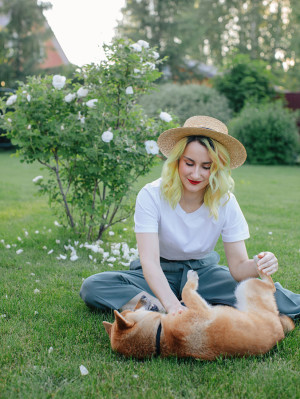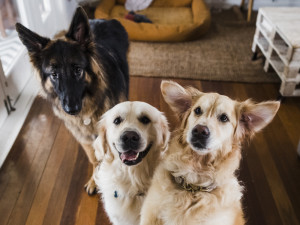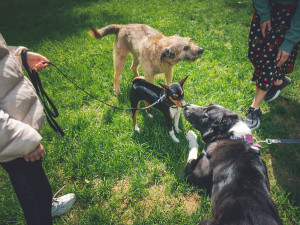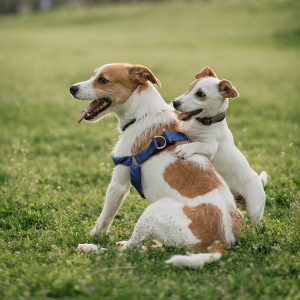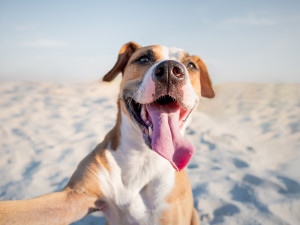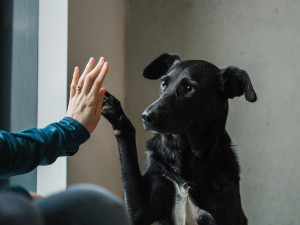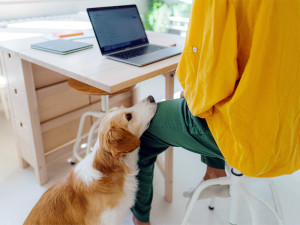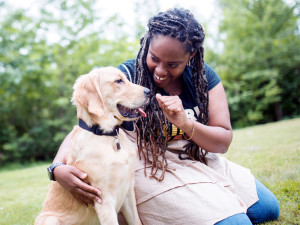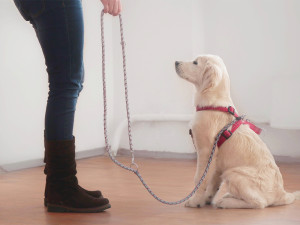There’s No Such Thing As A Dog That’s Too Friendly... Is There?
Is your dog too friendly with strangers or other dogs? Learn effective strategies to manage and train your overly sociable dog to ensure proper behaviour and safety
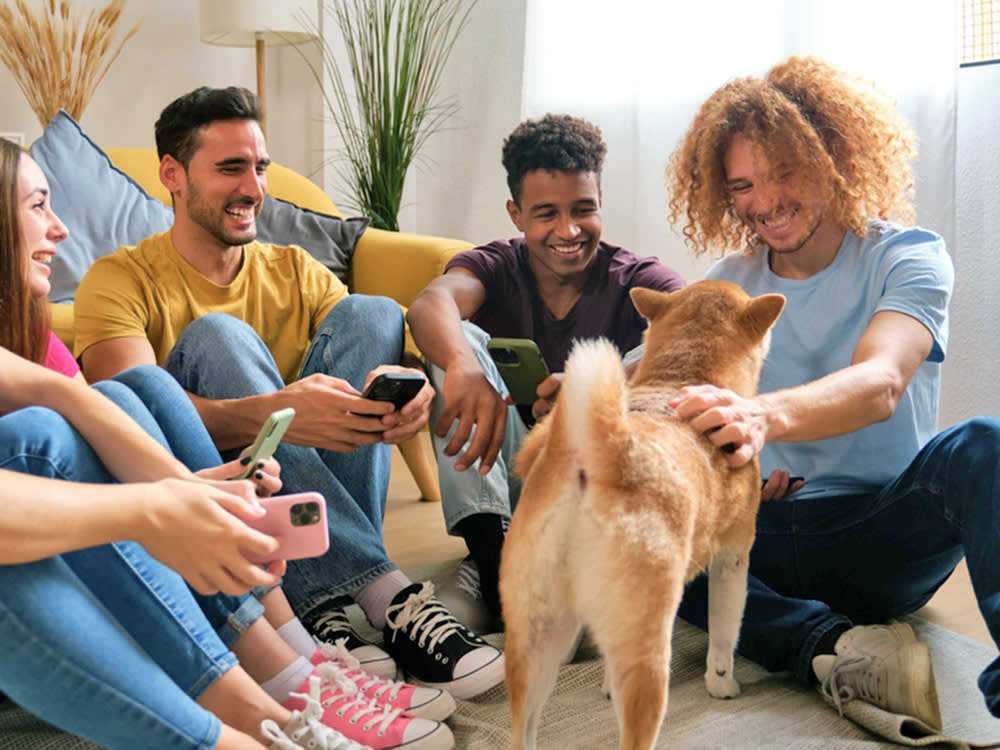
Share Article
“Don’t worry, they’re friendly!” Have you ever been guilty of uttering these words as your dog ignores your recall requests and goes flying into an unsuspecting passerby or another dog? While this simple phrase offers some level of reassurance, it can be highly frustrating to hear if you have a dog or child who are fearful of other dogs.
If your dog is likely to have a bit of a ‘Fenton’ moment when they see other dogs or people, you might have an overly friendly canine companion who finds it hard to commit to you when it sees the opportunity for a social encounter.
The social diva of the dog park can be comical to watch as they run around making friends with anyone and everyone - but if you’re at the other end of the lead, wanting them to come back to you it can be highly frustrating. Conversely, it can also be frustrating for the guardians of less sociable dogs or dogs who are in season or recovering from injury. An unrequested jumping up of your dog onto a stranger – especially if they’re not an understanding ‘dog person’ – can also be a bit of a challenge… whether it’s muddy season or not, not everyone wants to get up close and personal with your dog when out on a walk.
While having a pro-social dog is arguably much less of a challenge than having an anxious or reactive dog in your family, it can still bring many challenges. And these are challenges that need addressing to ensure your dog can become a welcomed member of the canine community in your area – one that is invited over to friends or family members’ homes and one that doesn’t send all the local dog walkers making a sharp exit from the park on your arrival.
Understanding your dog’s friendly behaviour
Dogs are inherently sociable animals – with their evolutionary history and process of domestication having prioritised sociable traits. Originally pack animals, dogs have developed strong social instincts that drive them to seek companionship and form bonds with others, whether that's with dogs or humans. These instincts are rooted in their need for cooperation, safety and survival in the wild. It’s fascinating to delve into the thousands of years of domestication – which have led to dogs adapting to human companionship. Our domesticated dogs have evolved to be highly attuned to human emotions, body language and social cues – their own emotions are even now impacted by ours!
Over-friendly behaviour can be demonstrated by excessive jumping, licking or seeking attention. But these behaviours can be misread. Sometimes, dogs may act over-friendly due to a lack of proper socialisation – and these ‘silly’ acts that look like a dog that’s just wanting to be your best friend are actually an indication that they’re uncomfortable.
Dogs respond really well to positive reinforcement, so behaviours that are rewarded early on in their life with affection or treats can become embellished. But while a young puppy wanting to climb into your lap or lick your face can seem cute - a 30kg adult dog covered in mud might be less so!
Certain breeds are naturally more sociable and affectionate, having been bred either for jobs that work alongside humans or purely for companionship. In puppy classes, we often see these pro-social traits early on in breeds such as Labradors who are very open to having relationships with other dogs and people. Other very friendly breeds include Cavalier King Charles Spaniels who were originally bred as companion dogs and Poodles who are notoriously eager to please.
Training tips to manage an overly-friendly dog
While we want to encourage our dogs to have positive social relationships, just like we would put boundaries in place for young children to keep them safe - we need to teach our dogs what behaviours are appropriate. Consistent training and reinforcement of calm and controlled social interactions can be highly effective in helping our dogs to get it right.
Tools and techniques
If you find that your dog’s off-lead behaviour is unmanageable and they are struggling to respond to your recall cues, then a long training lead is highly recommended. This allows you to keep your dog safe - as well as limiting their opportunity to run off to other people and dogs - while being able to give them some space to exercise and work on your training on walks.
A harness with a d-ring both on the front and back of it can help you to have a little more control if you find walking your dog a little tricky. This allows you to connect a lead with two points of contact - meaning you’re not putting too much pressure on one part of their body should they pull. No piece of equipment for walking your dog will negate the need for training though!
Practice your recall daily, in quiet locations to start with. Trying to teach your dog new skills in the middle of a busy dog park is never going to work. Your training needs to start in a space where your dog finds it really easy to take on the new learning - this is usually at home.
A clicker can work really well to mark the moment your dog makes a great choice. Say your dog looks towards you when you say their name, you have the chance to mark this moment with a ‘click’ that provides a promise of a food reward. A dog that has a promise of reward is more likely to respond to their human than one who doesn’t know if it’s more interesting to stay with you or run off to see another dog.
Scentwork and using your dogs brains is a great way to ensure overall wellbeing - as well as making sure their walk isn’t the only highlight of their day. Scattering treats in your garden (or on walks) allows your dog to get the calming benefits of sniffing and the happy hormones created when they find those pieces of food. A happy and relaxed dog is much more likely to be able to respond to their human!
When to seek professional help
If you feel your dog’s overly social behaviour has gotten out of hand, it can be really useful to have some support from an ethical trainer. Positive reinforcement methods of training offer a great way to truly connect and build a solid relationship with your dog.
Watching out for signs that your dog is actually displaying these behaviours - such as jumping up, licking, or being a little hyperactive - due to some other underlying reason other than a lack of training is really important. Dogs can sometimes display hyperactive behaviour due to a poorly-suited diet or even pain, as raising their adrenaline levels by being ‘silly’ can help with reducing the feeling of discomfort. If your dog suddenly seems to be displaying new behaviours, it’s always good to have them reviewed by your veterinarian.
A force-free trainer or behaviourist can be a wonderful line of support when working through any challenges you might be experiencing with your dog. Look for someone whose methods have been assessed by a membership such as the APDT UK, ABTC, ICAN, or APBC. You will find that the best behaviour practitioners will also want to work alongside your vet to ensure that you’re meeting the physical and emotional needs of the dog.
Having a sociable dog is something to celebrate - they’re feeling relaxed in the world and enjoying the adventures you take together. But it’s important to remember that there can be too much of a good thing - and your dog’s over-exuberance can impact those around you. Whether it’s approaching dogs who need space, children who are building confidence around dogs, or adults who have ingrained dog phobias - we need to be respectful of the community around us and ensure we’re able to keep our dog under control at all times.
Consistency of positive reinforcement training and working in environments where your dog can take learning on board are key to getting your dog’s over-sociability in check. While it’s great for your dog to have positive experiences with other dogs and people at regular intervals, it’s also valuable for them to understand that they aren’t able to meet every other being that they meet.
Frequently asked questions
Can a dog be too friendly?
Yes! An over-friendly dog can make it difficult for you to have appropriate social interactions with other dogs and people. It can also be a sign that their may be some physical or emotional issue that needs addressing.
How do I stop my dog from jumping on guests?
Understanding why your dog is jumping on guests is the first step - is it over-excitement or insecurity? Giving your dog an alternative job to do when guests arrive can be a good way to manage this behaviour in the short-term. This can be as simple as giving them a filled food toy or long-lasting chew behind a stair gate or having them on-lead with you rewarding them by placing treats on the floor to encourage them to keep all four-paws on the floor.
Is it bad if my dog wants to greet every dog we meet?
While a sociable dog is a better challenge than an aggressive one - not every dog will enjoy your dog’s attention or affection. There will be dogs who don’t like being up close to any dog, some who find it harder on-lead but are comfortable with off-lead interactions. There will also be dogs who need space due to having medical conditions, being in season, or just being a little more senior. Helping your dog to understand they cannot meet every dog on walks will really help reduce frustration for both ends of the lead.

Caroline Wilkinson
Caroline Wilkinson is a Certified Animal Behaviourist. As the Founder of digital pet coaching service Barket Place, Caroline has a passion for improving connections between human and hound, with a focus on relationships and reduction of stress for canines living in a human world.
Related articles
![Dog in the sand smiling at the camera]()
What Are You Smiling At?
There’s a big difference between a dog smiling and showing their teeth
![Woman sitting in a cafe with her dog.]()
Can Your Shy New Rescue Dog Become a Social Creature?
With patience and positive reinforcement, you can do a lot to make up for lost time with socialisation
![A black dog holding its paw up to a woman's hand.]()
15 Amazing Facts About Dogs You Might Not Know
Boost your dog smarts with these cool facts
How to Help Your Dog Be Just a Little Less Needy
You love that your dog is your shadow, but maybe not when you’re on a Zoom call
![kneeling woman with braids training her golden retriever]()
How to Find the Right Trainer, No Matter What Your Dog’s Been Through
With so many dog trainers out there that it can be hard to know who you can actually trust (especially if your dog has trust issues of their own), here’s where to start…
![a dog held on a leash sits calmly]()
Top 10 Easiest Dogs to Train
Spoiler: it’s not about the breed. But these pups are pretty brainy

